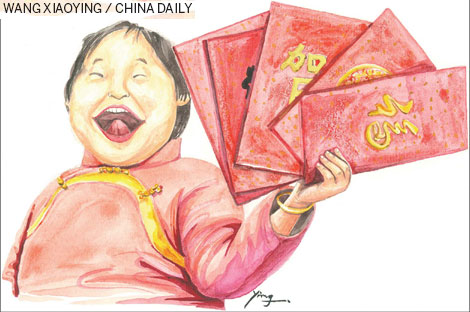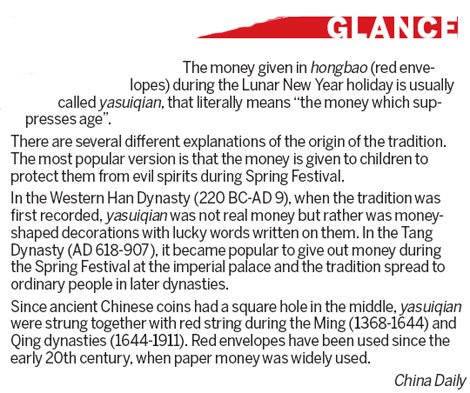
 'Taken 2' grabs movie box office crown
'Taken 2' grabs movie box office crown
 Rihanna's 'Diamonds' tops UK pop chart
Rihanna's 'Diamonds' tops UK pop chart
 Fans get look at vintage Rolling Stones
Fans get look at vintage Rolling Stones
 Celebrities attend Power of Women event
Celebrities attend Power of Women event
 Ang Lee breaks 'every rule' to make unlikely new Life of Pi film
Ang Lee breaks 'every rule' to make unlikely new Life of Pi film
 Rihanna almost thrown out of nightclub
Rihanna almost thrown out of nightclub
 'Dark Knight' wins weekend box office
'Dark Knight' wins weekend box office
 'Total Recall' stars gather in Beverly Hills
'Total Recall' stars gather in Beverly Hills
For love and money
Updated: 2012-02-09 10:05
By Wang Kaihao (China Daily)
|
||||||||


The tradition of giving relatives' children envelopes of cash during Spring Festival persists because of the affections it conveys. Wang Kaihao reports.
This will be the last year Anhui province native Huang Qingqian will get envelopes of cash from her relatives during the Spring Festival. The 23-year-old will leave her hometown, the provincial capital Hefei, to work in a bank in Shanghai. Local tradition dictates that those who earn their own money don't receive the red envelopes, called "hongbao", during the Lunar New Year. While the ancient custom was perhaps born at least partly out of economic traditions, it has survived until the present day largely because of the affections it represents. Huang got 25,000 yuan ($3,964) - a handsome sum, indeed - because she studied in Britain and didn't return for Spring Festival in 2011.
So her relatives wanted to make up for the lost time and money, she explains.
Her extended family is scattered throughout Anhui, so the festival is a "precious opportunity for a family reunion", Huang says. "Red envelopes are just a sideshow of the celebration."
This attitude seems to have been passed down by Huang's mother, Wang Lingxiang.
"Giving red envelopes is a way to maintain relationships with relatives we don't see that often," the 47-year-old engineer says.
Often, the money flows throughout the family, rather than remaining in the possession of the person to whom it's given.
That's why Huang jokes: "I only get to keep the cash for two minutes. Then, my parents pass it on to our relatives' kids."
Huang says her relatives gave 200 yuan ($32) to every child five years ago but now give 10 times that.
"We don't care how much money it is," she says.
"It's about the affection it represents."
Her grandmother usually gives her 100 yuan, which she cherishes.
As Wang puts it: "The amount we give depends on our financial situation."
Relatives without children often get gifts like cigarettes, liquor and teas, which can cost more than she would typically put in red envelopes, Wang says.
Not only will newly employed youth like Huang not receive red envelopes next Spring Festival but also they'll have to give them.
This Spring Festival was the first for Li Yanzhen, from Jiangsu's provincial capital Nanjing, to hand out, rather than be handed, red envelopes. The 25-year-old landed a job as a financial investor in 2011.
"Getting red envelopes was so exciting as a kid, but earning my own money as an adult feels even better," Li says.
"People care about face. It's sort of embarrassing to visit a relative who has kids without giving money. The envelope's value goes beyond the cash."
Li gave 100 yuan to her younger cousins and 800 yuan to both of her parents.
"I didn't give that much because I've only been employed for a few months and don't know what's appropriate," she says.
"But I don't think the sum matters."
But some younger children care about how much they bring in and compare totals with friends.
Zhao Yutong, a 12-year-old junior high school student from Wuhu, Anhui province, received about 2,000 yuan during Spring Festival.
"One classmate got 4,200 yuan and another got 3,200," Zhao says.
"It's not cool to get less."
Zhao rarely gets pocket money and was hoping to rake in a lot during the festival to buy her favorite Japanese comics.
Older teens usually care less about the amount.
Fan Zongjian, a 16-year-old senior high school student from Ankang, Shaanxi province, says it doesn't matter that he got 2,000 yuan while his classmates got about 7,000 yuan.
"Whatever the amount of money inside, what's important is the envelope shows my family's love for me," he says.
"So I don't compare it with what my classmates get."
He doesn't even care that his parents confiscated all of his cash, even though he dreams of buying an iPad.
"I don't care if they take it, because they've spent so much time taking care of me and have bought me things," Fan says.
"So, it's OK if they keep the money."
And they'll spend it on him in the end. All of Fan's red envelopes are saved in a bank account his parents created to pay for his college.
"They say it's for my future studying abroad," Fan says.
"It's better to put the money toward a plan rather than spending it on just anything."
Most Viewed
Editor's Picks

|

|

|

|

|

|
Today's Top News
Health new priority for quake zone
Xi meets US top military officer
Japan's boats driven out of Diaoyu
China mulls online shopping legislation
Bird flu death toll rises to 22
Putin appoints new ambassador to China
Japanese ships blocked from Diaoyu Islands
Inspired by Guan, more Chinese pick up golf
US Weekly

|

|







